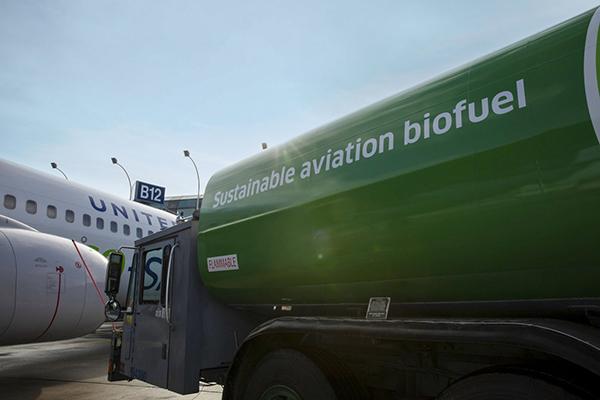
Aernnova to build Heart Aerospace electric regional airframe
Spanish aerostructures company Aernnova Aerospace plans to design and build the airframe for Swedish startup Heart Aerospace’s ES-19 all-electric 19-seast regional airliner. Aernnova is a major Tier 1 supplier to Airbus, Boeing, Embraer, Textron and other aerospace OEMs. Gothenburg-based Heart plans to fly the first flight-test ES-19 in 2024 and is targeting certification and entry into service in 2026. The startup has commitments for more than 500 aircraft including purchase agreements with United Airlines and Mesa Airlines for 200 aircraft.

Regional lessor backs zero-emissions propulsion retrofits
Regional aircraft lessor Montrose Global Aircraft Management signed an MOU with Dante Aeronautical to retrofit turboprop aircraft with hydrogen-electric powertrains. A lessor of Cessna Caravans, ATRs, De Havilland Canada Twin Otters and Dash 8s, London-based Montrose Global has established a new subsidiary, Monte Aircraft Leasing, focused on enabling the transition of regional aviation to net-zero cabin emissions. Monte plans to retrofit existing turboprops with electric and hybrid propulsion and acquire and finance new zero-emission aircraft as they become available.

Etihad’s sustainability partnership gains traction
Etihad Airways signed multiple partnership and collaboration agreements with manufacturers, suppliers and stakeholders at the 2021 Dubai Airshow, to drive decarbonization. Etihad’s work with partners, including Boeing, GE, Airbus and Rolls-Royce, supports the organisation’s strategic objectives to achieve a 20% reduction in emissions intensity in its passenger fleet by 2025, cut 2019 net emissions by 50% by 2035, and reach net zero emissions by 2050.

Air Canada, Carbon Engineering partner on CO2 direct air capture
Air Canada and Canadian clean-energy company Carbon Engineering (CE) will explore the potential use of direct air capture technology to remove CO2 from the atmosphere for permanent storage or use in the production of sustainable aviation fuel (SAF). Under their MOU, Air Canada and CE will identify potential opportunities for permanent removal of atmospheric CO2 by combining DAC with secure geologic storage. The partners will also explore use of the captured CO2 and green hydrogen to produce SAF via CE’s Air to Fuels technology, which is based on LanzaTech’s already-approved alcohol-to-jet process. The MOU includes the potential for Air Canada to purchase SAF produced using CE’s technologies.

SITA, Envision Digital partner on airport net-zero technology
IT provider SITA and Envision Digital, a Singapore-headquartered global net zero partner and Artificial Intelligence of Things (AIoT) technology provider, signed an MOU to jointly build end-to-end net zero carbon solutions for airports worldwide. The collaboration will harness Envision Digital’s strengths in digitalization, data management, and artificial intelligence applied to energy and smart building solutions, and SITA’s strengths in air transport technology and operations to support airports in their journey towards net zero carbon emissions. The MOU forms part of SITA’s strategy to help the air transport industry reduce its carbon footprint through greater operational efficiencies.

Australian mining company to supply green hydrogen supply
Zero-emissions propulsion startup Universal Hydrogen signed an agreement with a clean-energy subsidiary of Australian mining company Fortescue Metals Group to secure a supply of green hydrogen through to 2035. Under the MOU, Universal Hydrogen (UH2) and Fortescue Future Industries (FFI) will negotiate a global offtake agreement for green hydrogen to power the fuel-cell powertrain retrofits the US startup is developing for regional aircraft. The companies will also conduct a scoping study to develop green hydrogen production and logistics hubs in Iceland, New Zealand and Queensland, Australia. UH2 has a LOI from Icelandair Group to convert its De Havilland Canada Dash 8 fleet to hydrogen-electric propulsion.

IAG, Velocys ink SAF purchase deal
International Airlines Group (IAG) signed an MOU with sustainable aviation fuel (SAF) technology company Velocys to acquire 220,000 tonnes of SAF over 10 years. The purchase amount equates to around one-third of the planned output of the company´s new Bayou Fuels project in the US when it begins delivery in 2026, said IAG, the parent company of British Airways, Aer Lingus, Iberia, Level and Vueling. The technology used in the project will capture CO2 from the manufacturing process to permanently remove it from the atmosphere and IAG plans to purchase 1 million tonnes of sustainable jet fuel per year enabling it to cut its annual emissions by two million tonnes by 2030.

ZeroAvia, HAL partner on hydrogen-electric Dornier 228 certification
Startup ZeroAvia partnered with India’s Hindustan Aeronautics (HAL) to develop a supplemental type certificate (STC) for its conversion of the 19-passenger Dornier 228 regional turboprop to hydrogen-electric propulsion. ZeroAvia has also signed an agreement with Irish cargo airline ASL Aviation Holdings to covert the ATR 72 freighter to hydrogen fuel-cell propulsion.

Airbus demonstrates formation flight to save fuel, reduce CO2 emissions
Airbus has performed the first long-haul demonstration of formation flight in general air traffic (GAT) regulated transatlantic airspace with two A350 aircraft flying at three kilometers apart from Toulouse, France to Montreal, Canada. Over 6 tons of CO2 emissions were saved on the trip, confirming the potential for more than a 5% fuel saving on long-haul flights. The “final demonstration” test flight took place Nov. 9, 2021 involving two A350 test aircraft, MSN1 and MSN59, the former as the leader aircraft and the latter as the follower. This was made possible with flight control systems developed by Airbus, which position the follower aircraft safely in the wake updraft of the leader aircraft allowing it to reduce engine thrust and reduce fuel consumption. A similar principle can be observed with large migrating birds such as geese, which fly together in a distinct V-shaped formation.

Embraer unveils regional sustainable aircraft concepts
Embraer unveiled a series of 9- to 50-seat sustainable aircraft concepts designed to revitalize regional connectivity as digitalization enables more people to live and work away from major cities. The Energia family of concepts is aimed at entry into service between 2030 and 2040. With all-electric, hybrid-electric or hydrogen-fueled propulsion for low emissions and noise, the four aircraft concepts fit between Embraer’s planned Eve urban air taxi and its proposed 70-90-seat regional turboprop and existing 100-150-seat E-Jet E2 series. Pictured: Energia concepts [clockwise from front right]: hybrid-electric E9-HE, all-electric E9-FE, hydrogen-turbine E50-H2GT and hydrogen-electric H19-H2FC.

WEF launches purchasing coalition to accelerate decarbonization
The World Economic Forum (WEF) launched an initiative to accelerate the commercialization of decarbonizing technologies by leveraging collective demand from companies prepared to commit to purchases by 2030. The First Movers Coalition is targeting seven sectors, including aviation, that together account for more than a third of global carbon emissions but do not have cost-competitive clean energy alternatives to fossil fuels. An eight sector, direct air capture of CO2, is also targeted.

Iberia makes first SAF flight
International Airlines Group (IAG) member Iberia completed its first flight using sustainable aviation fuel (SAF) provided by Spanish fuel and energy company Repsol. The 40-min. Iberia flight in November 2021 was operated by an Airbus A320neo powered by CFM LEAP-1A engines from Madrid Barajas Airport to the northern city of Bilbao. Iberia said the flight saw CO2 emissions reduced to 1.4 tons, a result of the combination of the aircraft’s fuel efficiency and the sustainable biofuel. Iberia and Repsol worked with Aena, the state-owned company that manages airports and heliports in Spain.

Startup Wright aims for 2026 for electric BAe 146
US startup Wright Electric plans to convert a 100-seat regional jet, the BAe 146, to zero-emissions electric propulsion for entry into service in 2026. Wright is focusing on 1-hr. flights over routes of 400 nm or shorter at jets speeds and altitudes. Wright is ground-testing a 2-megawatt electric motor and ultimately plans to develop a new 180-seat zero-emission short-haul airliner. With 2026 as the target for entry into service, the startup plans to fly a 146 with a 2.5-3-megawatt electric motor replacing one of its four Honeywell ALF502 turbofans in 2023, with two motors in 2024 and with all four motors in 2025. Initially, Wright plans to use the existing fan and nacelle.

Alaska Airlines switches to Boxed Water
Alaska Airlines in November 2021 switched to Boxed Water cartons and recyclable paper cups, which will eliminate 1.8 million lbs. of single-use plastics from flights over the next year, equivalent to the weight of 18 Boeing 737s.

Large-scale SAF production plans drawn up for Sweden
Scandinavian Airlines (SAS) will partner with three fuel-sector companies to investigate large-scale production of synthetic sustainable aviation fuel (SAF) in Sweden, the companies announced Nov. 3. SAS will link with fuel company Shell, SAF producer LanzaTech and European energy company Vattenfall on the project, which will study the possibility of creating a new production facility capable of producing up to 50,000 tonnes of synthetic SAF annually. That figure would be roughly one-third of the total needed to reach Sweden’s national target of fossil fuel-free domestic air travel. The synthetic SAF, known as electrofuel, would be produced from fossil-free electricity from the country’s electricity grid and carbon dioxide recovered from Vattenfall’s combined heat and power district heating system in Uppsala, Sweden. Around 200,000 tonnes of CO2 can be recovered annually from the system.
As the aviation sector moves closer to net-zero carbon emissions targets, more industry partners are stepping up to back initiatives from sustainable aviation fuel (SAF) to electric aircraft.
